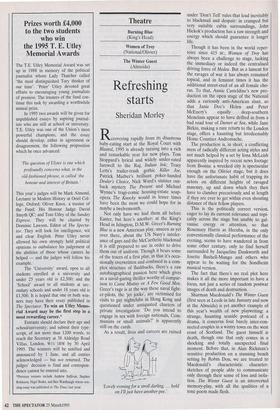Theatre
Burning Blue (King's Head) Women of Troy (National/Olivier) The Winter Guest (Almeida)
Refreshing starts
Sheridan Morley
Recovering rapidly from its, disastrous baby-eating start at the Royal Court with Blasted, 1995 is already turning into a rich and remarkable year for new plays. Tom Stoppard's lyrical and widely under-rated farewell to the Raj, Indian Ink; Tracy Letts's trailer-trash gothic Killer Toe, Patrick Marber's brilliant poker-handed Dealer's Choice, Nick Ward's sinister out- back mystery The Present and Michael Wynne's tragi-comic housing-estate soap- opera The Knocky would in lesser times have been the most we could hope for in maybe a twelvemonth.
Not only have we had them all before Easter, but here's another; at the King's Head in Islington, D.M.W. Greer's Burning Blue is a new American play, unseen as yet over there, about the US Navy's intoler- ance of gays and the McCarthrite blackmail it is still prepared to use in order to drive them out of uniform. Though it bears some of the traces of a first play, in that it's occa- sionally overwritten and confused in a com- plex structure of flashbacks, there's a raw autobiographical passion here which gives us a naval-gazing thriller worthy of compar- ison to CaMe Mutiny or A Few Good Men. Greer's rage is at the way these naval fight- er-pilots, the 'jet jocks', are victimised for visits to gay nightclubs in Hong Kong and questioned under antiquated charters of private investigation: 'Do you intend to engage in sex with foreign nationals, Com- munists or small animals?' is apparently still on the cards.
As a result, lives and careers are ruined `Lovely evening for a stroll darling ... hold on I'll just have another pee.' under 'Don't Tell' rules that lead inevitably to blackmail and despair: in cramped but very suitable cabin surroundings, John Hickok's production has a raw strength and energy which should guarantee it longer life.
Though it has been in the world reper- toire since 415 BC, Women of Troy has always been a challenge to stage, lacking the immediacy or indeed the centralised driving force of Medea. But as a lament for the ravages of war it has always remained topical, and in feminist times it has the additional street-cred of an all female cho- rus. To that, Annie Casteldine's new pro- duction on the open stage of the National adds a curiously anti-American slant, so that Janie Dee's Helen and Peter McEnery's equally deep-southern Menelaus appear to have drifted in from a bad road tour of Dames at Sea, while Jane Birkin, making a rare return to the London stage, offers a haunting but irredeemably Home Counties Andromache.
The production is, in short, a conflicting mess of radically different acting styles and not much helped by a set by Iona McLeish apparently inspired by recent news footage from Bosnia: a wrecked city is spectacular enough on the Olivier stage, but it does have the unfortunate habit of trapping its actors on different heights of ravaged masonry, up and down which they then have to clamber precariously and at length if they are ever to get within even shouting distance of their fellow players.
This is the politically correct version, eager to lay its current relevance and topi- cality across the stage but unable to gal- vanise energy or attention, so that Rosemary Harris as Hecuba, in the only conventionally classical performance of the evening, seems to have wandered in from some other century, only to find herself surrounded by Jacqueline Dankworth and Josette Bushell-Mungo and others who appear to be waiting for the Sondheim musical version.
The fact that there's no real plot here makes it all the more important to have a focus, not just a series of random postwar images of death and destruction.
Sharman Macdonald's The Winter Guest (first seen at Leeds in late January and now at the Almeida) is yet another example of this year's wealth of new playwriting: a strange, haunting seaside postcard of a drama, it concerns four barely inter-con- nected couples in a wintry town on the west coast of Scotland. The guest himself is death, though one that only comes in a shocking and totally unexpected final moment. Before that, in Alan Rickman's sensitive production on a stunning beach setting by Robin Don, we are treated to Macdonald's characteristic character- sketches of people able to communicate only through their sense of loss and isola- tion. The Winter Guest is an introverted memory-play, with all the qualities of a tone poem made flesh.


























































 Previous page
Previous page